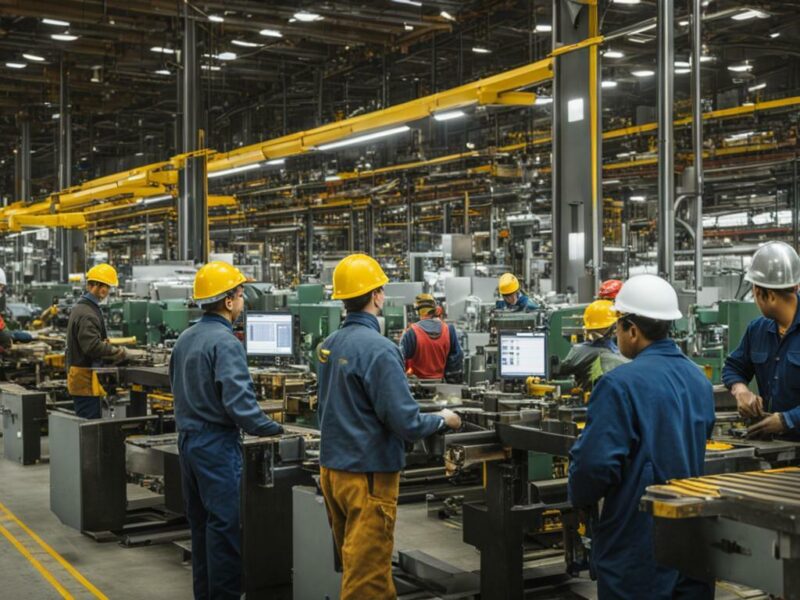Are you looking to maximize your career opportunities in Canada? Discover the in-demand skilled trades and manufacturing jobs across the country and unlock your potential for success.
Key Takeaways:
- Skilled trades and manufacturing jobs are in high demand across Canada.
- The construction industry offers careers such as electricians, carpenters, plumbers, welders, and heavy equipment operators.
- The transportation industry includes jobs like automotive service technicians and heavy-duty equipment technicians.
- Manufacturing and industrial sectors require tool and die makers, industrial mechanics, and metal fabricators.
- In the services sector, there is demand for cooks, hairstylists, and landscape horticulturists.
The Construction Industry: Electricians, Carpenters, Plumbers, Welders, and Heavy Equipment Operators
The construction industry in Canada offers a wide range of skilled trades opportunities, including electricians, carpenters, plumbers, welders, and heavy equipment operators. These occupations are in high demand across the country, with job growth expected in the coming years. Whether you’re interested in working on building projects, infrastructure development, or home renovations, the construction industry provides rewarding career paths for individuals with the right skills.
Electricians play a vital role in the construction industry, ensuring that electrical systems are safely installed and maintained. From residential buildings to commercial complexes, electricians are needed to handle wiring, lighting, and power distribution. Carpenters, on the other hand, specialize in woodworking, constructing and repairing structures such as buildings, bridges, and staircases. Plumbers are responsible for installing and maintaining plumbing systems, including pipes, fixtures, and drainage systems.
Another important skilled trade in the construction industry is welding. Welders use heat and specialized equipment to join metal parts, contributing to the construction of buildings, bridges, and other structures. Meanwhile, heavy equipment operators operate machinery such as excavators, bulldozers, and cranes, playing a critical role in earthmoving, site preparation, and construction projects.
To provide a comprehensive overview of the construction industry trades in demand across Canada, here is a table summarizing the occupations, their descriptions, and the projected job growth:
| Occupation | Description | Projected Job Growth |
|---|---|---|
| Electricians | Responsible for electrical installations and maintenance | 5% (2019-2029) |
| Carpenters | Construct and repair building frameworks and structures | 4% (2019-2029) |
| Plumbers | Install and maintain plumbing systems | 4% (2019-2029) |
| Welders | Join metal parts using heat and specialized equipment | 2% (2019-2029) |
| Heavy Equipment Operators | Operate machinery for earthmoving and construction projects | 3% (2019-2029) |
As you can see, these skilled trades in the construction industry offer stable employment opportunities and the chance to contribute to the growing infrastructure and development across Canada.
The Transportation Industry: Automotive Service Technicians and Heavy-Duty Equipment Technicians
The transportation industry in Canada offers promising career opportunities in skilled trades, particularly for automotive service technicians and heavy-duty equipment technicians. With a growing demand for skilled tradespeople in this sector, individuals with expertise in maintaining and repairing vehicles and equipment can find stable and rewarding careers.
Automotive service technicians are responsible for diagnosing, repairing, and maintaining a wide range of vehicles, from cars and trucks to motorcycles and buses. The demand for these professionals is driven by the constant need for transportation and the increasing complexity of modern vehicle technology. As vehicles become more advanced, the skills and knowledge required to service them are also evolving.
Heavy-duty equipment technicians, on the other hand, specialize in maintaining and repairing large machinery used in industries such as construction, mining, and agriculture. They work on equipment like bulldozers, cranes, graders, and agricultural machinery. The demand for these technicians is driven by the construction and resource industries, which rely heavily on robust and well-maintained equipment.
Job Prospects
The job prospects for automotive service technicians and heavy-duty equipment technicians in Canada are excellent. According to the Canadian Occupational Projection System (COPS), there is expected to be strong demand for both occupations in the coming years. This is due to factors such as population growth, an aging workforce, and the need to replace retiring tradespeople.
Furthermore, as technology continues to advance in the transportation industry, there will be a need for skilled tradespeople who can adapt to new systems and technologies. Employers are looking for technicians who can diagnose and repair complex electronic systems, hybrid vehicles, and other emerging technologies.
In summary, the transportation industry in Canada offers numerous opportunities for individuals skilled in automotive service and heavy-duty equipment technicians. With the demand for skilled tradespeople in this sector on the rise, pursuing a career in these fields can lead to a secure and fulfilling profession.
Manufacturing and Industrial Sectors: Tool and Die Makers, Industrial Mechanics, and Metal Fabricators
The manufacturing and industrial sectors in Canada are highly dynamic, offering a range of skilled trades positions, including tool and die makers, industrial mechanics, and metal fabricators. These occupations play a crucial role in supporting various industries, such as automotive, aerospace, and manufacturing. With the growing demand for high-quality products and efficient production processes, skilled tradespeople in these sectors are in high demand.
Tool and die makers are skilled professionals who design, build, and repair specialized tools and dies used in manufacturing processes. This occupation requires a high level of precision and attention to detail, as tool and die makers produce parts with tight tolerances that are essential for maintaining product quality.
Industrial mechanics, also known as millwrights, are responsible for installing, maintaining, and repairing machinery and equipment in industrial settings. They play a critical role in ensuring the safe and efficient operation of production lines, conducting regular inspections, troubleshooting mechanical issues, and performing preventive maintenance tasks.
Metal fabricators are skilled tradespeople who specialize in shaping, cutting, and assembling metal components. They work with a variety of metals, such as steel, aluminum, and copper, using various tools and techniques such as welding, shearing, and bending. Metal fabricators are essential in the production of structural components, machinery, and equipment across different industries.
According to data from the Canadian Occupational Projection System (COPS), these skilled trades occupations are expected to have sustained demand in the coming years. The manufacturing sector’s job market trends indicate a need for qualified professionals who can adapt to new technologies and processes, ensuring the industry remains competitive in the global market.
| Occupation | Salary Range | Projected Job Growth |
|---|---|---|
| Tool and Die Makers | $25 – $40 per hour | Stable |
| Industrial Mechanics | $28 – $40 per hour | Stable |
| Metal Fabricators | $20 – $30 per hour | Stable |
The table above provides an overview of the salary range and projected job growth for these skilled trades occupations within the manufacturing and industrial sectors. While the salary range may vary depending on factors such as experience and location, these occupations offer competitive wages and stable employment opportunities.
For individuals interested in pursuing a career in the manufacturing and industrial sectors, there are various pathways available. Apprenticeships are a common route, providing hands-on training and practical experience under the guidance of experienced tradespeople. Other options include trade qualification assessment programs, which evaluate the skills and knowledge of individuals with prior experience in the field, and pre-trades programs that offer foundational training before entering an apprenticeship.
Passing the Red Seal examination is a valuable achievement for skilled tradespeople, as it provides a recognized professional designation across Canada. Holding a Red Seal endorsement demonstrates a high level of skill and expertise, enhancing career prospects and opening up opportunities for advancement within the industry.
The manufacturing and industrial sectors offer promising prospects for skilled tradespeople in Canada. By acquiring the necessary skills and staying updated with emerging technologies, individuals can secure stable employment and contribute to the growth and innovation of these vital industries.
Services Sector: Cooks, Hairstylists, and Landscape Horticulturists
The services sector in Canada offers a diverse range of skilled trades job opportunities, including positions for cooks, hairstylists, and landscape horticulturists. These professions are in high demand and provide excellent career prospects for individuals with a passion for creativity, culinary arts, and outdoor aesthetics.
Cooking is an art form, and chefs are in constant demand in restaurants, hotels, and catering services across the country. The culinary industry offers a wide range of opportunities, from working in a fast-paced commercial kitchen to creating unique dishes in fine dining establishments. Chefs have the chance to let their creativity shine while satisfying the taste buds of countless patrons.
“The smell of good bread baking is like the sound of lightly flowing water, is indescribable in its evocation of innocence and delight… Breadmaking is one of those almost hypnotic businesses, like a dance from some ancient ceremony.” – Barbara Kingsolver
Hairstylists are another vital part of the services sector. The demand for skilled hairstylists who can create stunning looks and keep up with the latest trends is ever-present. Whether it’s cutting, coloring, or styling, hairstylists have the opportunity to transform their clients’ appearance and boost their confidence.
Landscape horticulturists play a crucial role in creating and maintaining beautiful outdoor spaces. From designing gardens to planting and caring for trees and flowers, these professionals bring life and beauty to residential and commercial areas. With an increasing focus on environmental sustainability and green spaces, landscape horticulturists are in high demand across Canada.
Information and Digital Technology Skills in Skilled Trades
In today’s digital age, information and digital technology skills are becoming increasingly valuable in various skilled trades across different sectors in Canada. As industries continue to evolve and adapt to technological advancements, tradespeople with proficiency in these skills are in high demand. The integration of technology in skilled trades not only enhances efficiency and productivity but also opens up new opportunities for growth and innovation.
One example of the growing importance of information and digital technology skills is the construction industry. From using Building Information Modeling (BIM) software to create accurate 3D models of construction projects to utilizing drones for site inspections and surveying, technology is revolutionizing how construction projects are planned and executed. Tradespeople who are skilled in these digital tools can effectively contribute to the construction process and collaborate seamlessly with other professionals involved in the project.
“Technology has become an integral part of skilled trades, allowing tradespeople to work smarter and more efficiently.”
Moreover, in the manufacturing and industrial sectors, automation and robotics are becoming increasingly prevalent. Skilled tradespeople who can operate and maintain advanced machinery and production systems have a competitive edge in the job market. From programming and troubleshooting programmable logic controllers (PLCs) to utilizing computer numerical control (CNC) machines, the ability to understand and leverage information and digital technology is crucial in these fields.
Table 1: Examples of Information and Digital Technology Skills in Skilled Trades
| Skilled Trade | Relevant Information and Digital Technology Skills |
|---|---|
| Electrician | Knowledge of smart home automation systems and electrical control panels |
| Welder | Understanding of computer-aided design (CAD) software for precision welding |
| Automotive Service Technician | Proficiency in diagnostic software and vehicle telematics |
Skilled tradespeople who possess information and digital technology skills are well-positioned to meet the demands of the evolving job market. By staying updated on the latest technological advancements in their respective trades, they can enhance their career prospects and contribute effectively to their industries’ growth and development. Whether it’s working with advanced machinery, utilizing digital tools for project management, or leveraging data analytics for process optimization, tradespeople with these skills are invaluable assets in today’s high-demand occupations.
Top In-Demand Skilled Trades Across Canada
Wondering which skilled trades are in highest demand across Canada? Here are the top in-demand occupations that offer excellent job growth and prospects:
| Occupation | Industry |
|---|---|
| Cooks | Services sector |
| Industrial electricians | Manufacturing and industrial sectors |
| Industrial mechanics | Manufacturing and industrial sectors |
| Painters and decorators | Construction industry |
| Welders | Construction industry |
These skilled trades are in high demand and offer promising career opportunities across various industries in Canada.
The services sector, which includes occupations like cooks, provides a range of job opportunities in restaurants, hotels, and catering companies. The growth in the hospitality industry has created a demand for skilled cooks to meet the needs of the growing population and tourism sector.
In the manufacturing and industrial sectors, industrial electricians and mechanics play a crucial role in maintaining and repairing electrical systems and machinery. With the continuous advancement of technology, the need for skilled individuals in these trades is on the rise.
Within the construction industry, painters and decorators, along with welders, are highly sought after for their skills in enhancing the aesthetic appeal of structures and ensuring the integrity of metal components. As urban development and infrastructure projects continue to thrive, the demand for these tradespeople remains strong.
It’s important to note that these are just a few examples of the top in-demand skilled trades in Canada. The job market is constantly evolving, and other trades may also offer excellent growth and prospects. By pursuing a career in a high-demand occupation, individuals can secure stable employment and contribute to the thriving Canadian job market.
Financial Support for Skilled Trades Pursuits
Pursuing a skilled trades career in Canada comes with financial support options, including interest-free loans and apprenticeship grants. These resources are designed to assist individuals in achieving their career goals and thriving in high-demand occupations. Whether you are considering a path in construction, transportation, manufacturing, or services, financial support is available to help you on your journey.
One avenue of financial assistance is through interest-free loans. These loans are specifically tailored for individuals pursuing skilled trades and provide a financial boost to cover the costs associated with training and education. These loans can help ease the financial burden and ensure that aspiring tradespeople have the necessary resources to succeed.
Another valuable form of financial support is through apprenticeship grants. Apprenticeships are a common pathway into skilled trades, allowing individuals to learn on the job while earning a wage. Apprenticeship grants provide additional financial aid to support apprentices throughout their training. These grants can help cover expenses such as tools, equipment, and textbooks, making the apprenticeship journey more accessible and affordable.
| Financial Support Options | Description |
|---|---|
| Interest-Free Loans | Loans designed specifically for individuals pursuing skilled trades. These loans provide financial support for training and education. |
| Apprenticeship Grants | Financial aid provided to apprentices to support them throughout their training. Grants can cover expenses such as tools, equipment, and textbooks. |
By taking advantage of these financial support options, individuals can alleviate some of the financial barriers that may exist when pursuing a skilled trades career. These resources not only provide the means to cover expenses but also enable individuals to focus on their training and development, setting them up for success in the job market.
Paths to Skilled Trades: Apprenticeships, Trade Qualification Assessment, and Pre-Trades Programs
There are multiple paths to launching a successful skilled trades career in Canada, including apprenticeships, trade qualification assessment, and pre-trades programs. These pathways provide individuals with the necessary knowledge, skills, and certifications to excel in their chosen trade. Whether you prefer hands-on learning or a more structured educational approach, there is an option suited to your needs and goals.
Apprenticeships
Apprenticeships are a popular choice for individuals looking to gain practical experience while earning a wage. These programs typically combine on-the-job training with classroom instruction, allowing apprentices to learn from experienced professionals in their chosen trade. Apprenticeships often span several years, during which apprentices gradually develop the skills required to become fully qualified tradespeople.
Trade Qualification Assessment
If you already have experience in a specific trade but lack formal certification, a trade qualification assessment can be a valuable option. This process involves evaluating your skills and knowledge against the recognized standards of your trade. Successful completion of a trade qualification assessment can lead to the issuance of a certificate or journeyman status, providing official recognition of your expertise.
Pre-Trades Programs
Pre-trades programs are designed to prepare individuals for entry into skilled trades careers by providing foundational knowledge and skills. These programs offer a structured curriculum that covers essential trade-specific subjects, such as safety regulations, tool usage, and trade theory. Pre-trades programs can be an excellent choice for those who want to gain a solid understanding of their chosen trade before entering the workforce.
| Pathway | Description |
|---|---|
| Apprenticeships | Combines on-the-job training with classroom instruction |
| Trade Qualification Assessment | Evaluates skills and knowledge against recognized trade standards |
| Pre-Trades Programs | Offers a structured curriculum covering trade-specific subjects |
“Choosing the right pathway to a skilled trades career is crucial for long-term success. Whether you opt for an apprenticeship, trade qualification assessment, or pre-trades program, each path offers unique benefits and opportunities. Take the time to research and consider which option aligns best with your interests and goals.”
By selecting the most suitable pathway, individuals can embark on a fulfilling skilled trades career in Canada. Whether you choose to learn on the job through apprenticeships, demonstrate your skills through trade qualification assessment, or gain foundational knowledge through pre-trades programs, each path sets you on the right track towards success.
The Value of the Red Seal Examination
Achieving the Red Seal examination in a skilled trade can provide a highly valuable professional designation that can enhance career prospects in Canada. The Red Seal program is a recognized standard of excellence for skilled trades across the country, ensuring that tradespeople meet national industry standards and deliver high-quality work. With its reputation for excellence, the Red Seal designation offers numerous benefits and opportunities for skilled tradespeople.
One of the key advantages of obtaining the Red Seal designation is that it enhances employability and job prospects. Employers recognize the Red Seal as a mark of quality and competency, making Red Seal holders highly sought after in the job market. According to the Canadian Apprenticeship Forum, 77% of employers prefer or require Red Seal certification when hiring skilled tradespeople. Having the Red Seal designation on your resume can give you a competitive edge and open doors to a wider range of career opportunities.
The Red Seal designation also comes with increased earning potential. Statistics Canada reports that Red Seal tradespeople generally earn higher wages compared to non-certified tradespeople. On average, Red Seal holders earn about 11% more than their non-certified counterparts. This wage premium reflects the high level of skill and expertise that Red Seal tradespeople bring to their respective trades.
| Benefits of Red Seal Certification |
|---|
| Enhanced employability and job prospects |
| Recognition of quality and competency |
| Higher earning potential |
| National mobility and transferability of credentials |
| Access to interprovincial job opportunities |
| Opportunities for career advancement and entrepreneurship |
Obtaining the Red Seal designation demonstrates your commitment to professionalism, skill, and continuous learning in your chosen trade. It not only helps validate your expertise but also provides a solid foundation for long-term success in the skilled trades industry.
Furthermore, the Red Seal designation offers national mobility and transferability of credentials. As a Red Seal holder, you can work in any province or territory in Canada without having to undergo additional certification. This flexibility allows you to explore different job markets and take advantage of opportunities across the country. It also gives you the freedom to relocate for personal or professional reasons, knowing that your skills and certification are recognized nationwide.
In addition to increased job opportunities, higher wages, and national mobility, the Red Seal designation opens doors to interprovincial job opportunities. Many large-scale construction, manufacturing, and infrastructure projects require Red Seal tradespeople, and these projects often span multiple provinces or territories. By holding the Red Seal certification, you can access these lucrative projects and work on exciting initiatives that contribute to the growth and development of Canada.
Lastly, achieving the Red Seal examination can pave the way for career advancement and entrepreneurship. The designation demonstrates your commitment to excellence and positions you as a trusted professional in your trade. With the Red Seal designation, you can explore leadership positions, mentorship opportunities, and even start your own business. The credibility and expertise associated with the Red Seal designation can give you the confidence and recognition needed to take your career to new heights.
Conclusion
In conclusion, identifying skilled trades and manufacturing jobs in demand across Canada is crucial for maximizing career opportunities in this thriving job market. Embrace the possibilities and unlock your potential for success in the diverse and dynamic world of skilled trades.
The construction industry offers a range of promising careers, including electricians, carpenters, plumbers, welders, and heavy equipment operators. The transportation industry also presents great prospects with jobs such as automotive service technicians and heavy-duty equipment technicians.
The manufacturing and industrial sectors require skilled tradespeople like tool and die makers, industrial mechanics, and metal fabricators. Similarly, the services sector seeks talented individuals in occupations such as cooks, hairstylists, and landscape horticulturists.
Furthermore, information and digital technology skills play an increasingly important role in many skilled trades across various sectors. By acquiring these skills, you can enhance your job prospects and open up more opportunities in today’s digital age.
Finally, don’t forget about the top in-demand skilled trades across Canada, which include cooks, industrial electricians, industrial mechanics, painters and decorators, and welders. These trades offer steady job growth and promising futures.
Financial support is also available to help you pursue a skilled trades career. Programs such as interest-free loans and apprenticeship grants can provide the necessary assistance to achieve your career goals.
Whether you choose to enter the skilled trades through an apprenticeship, trade qualification assessment, or pre-trades program, there are numerous paths available to kickstart your career. Additionally, obtaining the Red Seal examination can provide a highly valuable professional designation that sets you apart in the industry.
So, if you’re looking for a rewarding career with plenty of opportunities and job security, look no further than the world of skilled trades and manufacturing in Canada. Start exploring your options today!
FAQ
Q: What are some in-demand skilled trades and manufacturing jobs in Canada?
A: Skilled trades and manufacturing jobs in high demand across Canada include electricians, carpenters, plumbers, welders, heavy equipment operators, automotive service technicians, heavy-duty equipment technicians, tool and die makers, industrial mechanics, metal fabricators, cooks, hairstylists, and landscape horticulturists.
Q: Are information and digital technology skills important in skilled trades?
A: Yes, information and digital technology skills are important in many skilled trades. Having these skills can enhance job prospects and open up more opportunities in today’s digital age.
Q: What are the top in-demand skilled trades across Canada?
A: The top in-demand skilled trades across Canada include cooks, industrial electricians, industrial mechanics, painters and decorators, and welders.
Q: Is financial support available for those pursuing skilled trades?
A: Yes, financial support is available for those pursuing skilled trades. There are programs such as interest-free loans and apprenticeship grants that can assist individuals in achieving their career goals.
Q: What are the different paths to entering skilled trades careers in Canada?
A: The different paths to entering skilled trades careers in Canada include apprenticeships, trade qualification assessment, and pre-trades programs.
Q: What is the value of the Red Seal examination?
A: The Red Seal examination provides a highly valuable professional designation for tradespeople in Canada.
Source Links
- https://www.canada.ca/en/employment-social-development/campaigns/skilled-trades.html
- https://www.canadacareersite.com/blog/most-in-demand-skilled-trade-jobs-in-canada-in-2023
- https://www.narcity.com/canadas-most-in-demand-skilled-trades-get-paid-to-learn-them






